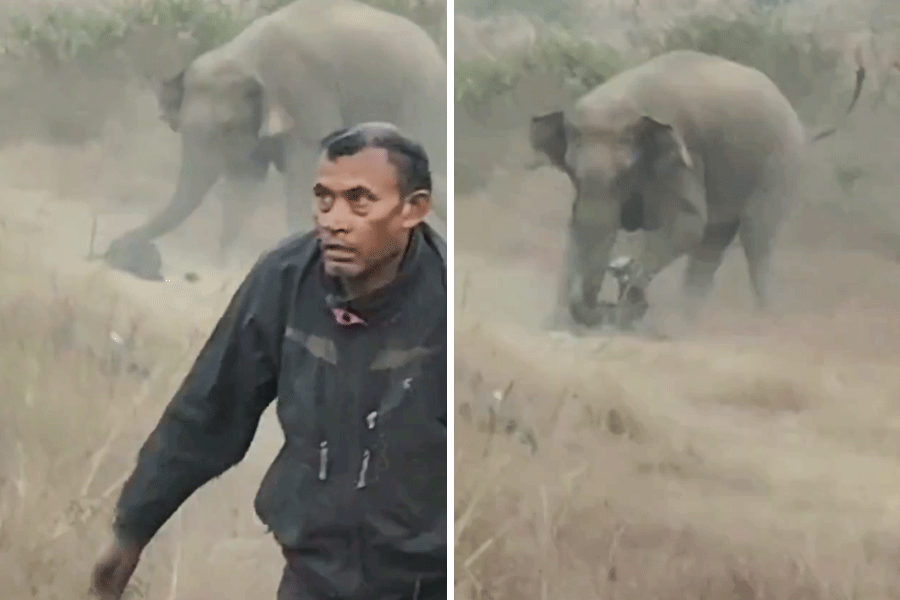 |
| Rachel Sermanni and Bickram Ghosh perform with Papon Angaraag Mahanta on Thursday. Picture by Rashbehari Das |
Calcutta, Dec. 30: On stage, there was a bass player, a percussionist, a pianist and two musicians who sing. But when Papon Angaraag Mahanta, one of them, started with the Bihu naam, the others had no clue how to synchronise. For they have never jammed on this tune before.
Then they strummed a little, tapped a little and slowly some mystic design caught up.
A “superior sound”, as promised by Bickram Ghosh, the percussionist, emerged. The hypnotic energy of the music soon got the discerning crowd of the International Centre for Cultural Relations in Calcutta to its feet, shedding all its inhibitions and grooved to the tune of Bihu naam.
The audience had came to catch the first public performance of a collaboration by musicians Ghosh, Papon and Scottish singer Rachel Sermanni for the Troikala project, an attempt to explore musical synergy in the folk genre across borders.
The Troikala project, organised by the British Council, attempts to fuse diverse musical elements, producing a repertoire that is unique, yet identifiable by cultures across the globe. While Sermanni gave voice to her songs Cry of War and What is Waiting, Papon and Ghosh joined in for a breathtaking and heady blend of mesmerising music. Dancer Jaya Seal’s impromptu vibrant Bihu performance rounded off the evening.
Before the performance, Papon threw some light on how the project works and how the elements merged.
“I bring in Assamese folk sensibilities and music derived from Borgeet and Bihu geet and Rachel brings in Scottish folk. Even though the two are very different, in every attempt we have found a common thread and made music from that,” he said.
“The geographic location of the music would be somewhere between Scotland and India I presume,” he smiled.
Ghosh had been introduced to Papon’s music much before the collaboration.
“My wife Jaya Seal, who is from Assam, introduced me to his first album Jonaki Rati. It was really impressive,” he said.
He considers the combination of the voices of Sermanni and Papon very suitable for the collaboration.
“Rachel has a nightingale sweet voice, very apt for Scottish folk and Papon carries the legendary deep and heavy Assamese voice, very resonant and mellifluous. The combination is wonderful,” he said.
For Sermanni, the young neo-folk artiste from Carrbridge, a village in Scotland, who laughs at little things with a twinkle in her eye and writes of unending rivers, this trip has been overwhelming
“I had no clue how to begin. So I started by mailing my ideas to the other collaborators. And till now it has been great. We have freely rejected or accepted ideas put forward by each of us. I have come up with a song about India and we begin with the song What is Waiting.”
The artistes are keeping an open mind on what will emerge and the kind of music that they are creating, using the acoustic guitar, piano, mandolin, tabla and other instruments.
“I can’t really explain this music. It is an amalgamation of different sounds and finally I hope we have come up with a superior sound,” he said.
In the midst of it all, the artistes, too, are having fun and Ghosh emphasises its importance.
“I am the senior-most of the three and have collaborated with artistes before. It is very important that artistes who collaborate like each other. We have been jamming for only three days and the chemistry is brilliant,” he said.
Papon, as usual with his feet firmly grounded in his homeland, said, “It is great that our folk music is now going mainstream and even international. I hope the youth back home will take inspiration from this and realise that one can conquer the world holding on to your roots.”
During Troikala, the trio will work till May next year to produce an album as well as go on a concert tour to the UK.











